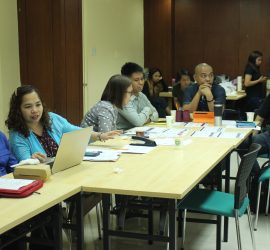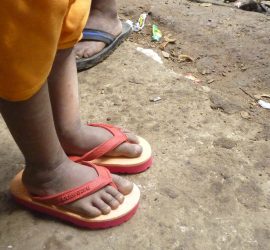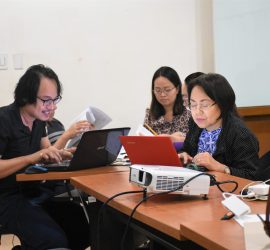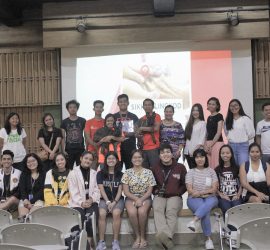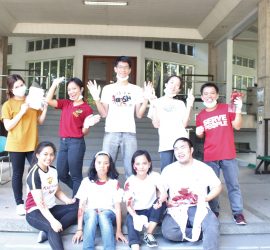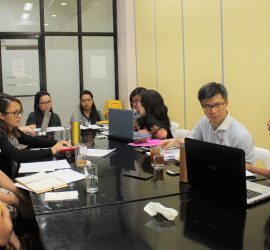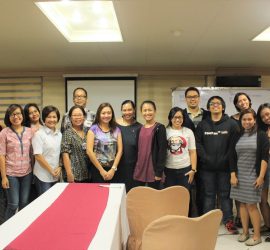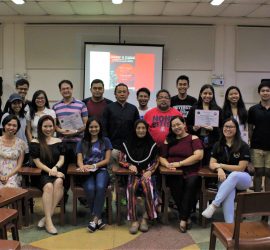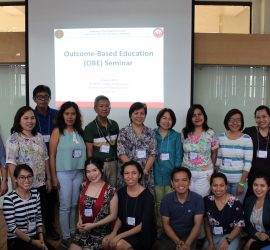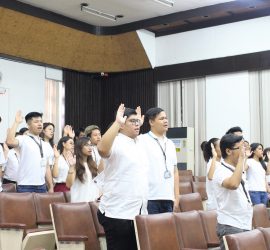Taking off from last year’s Program Mapping series, the National Service Training Program (NSTP) Diliman with NSTP Coordinators and Instructors held its first Program Mapping Workshop for the year last February 11, 2019 at the National Engineering Center, UP Diliman. The two group outputs from the last workshop on November 19, 2018 were combined into one NSTP Program Map by NSTP Diliman. This was presented to the assembly at the beginning of the activity by NSTP Director Arlyn P. Macapinlac. With the purpose to review and refine the NSTP Program Map, Prof. Macapinlac led the commencement of the activity. This was followed by the group workshop aimed to polish the program map. During the beginning of the workshop, it was determined that it would be easier to accomplish this goal if done by the whole congregation. The participants then proceeded to break out from their groups to listen to just one facilitator. With the facilitation of Prof. Julienne Baldo-Cubelo, the NSTP Program Map was reviewed item by item, taking note of the words and concepts encapsulated in each row and column. Participation from the audience was lively. Prof. Rosella M. Torrecampo, Director of the Office for the Advancement of Teaching, was also invited to impart her expertise on the OBEdization of the NSTP Program Map. Suggestions and corrections were raised by Prof. Torrecampo on the spot. At the end of the day, the NSTP Program Map was crafted and finished. NSTP Diliman will now be able to continue mapping the NSTP Common Module and NSTP Components: Civic Welfare Training Service (CWTS), Literacy Training Service (LTS), and Reserve Officers’ Training Corps (ROTC). These efforts are part of curriculum development of the National Service Training Program in UP Diliman. Coming up next is the NSTP Component Mapping Workshop in March. by Klaribelle Anne B. Languayan
ACTIVITIES
The National Service Training Program Diliman Office (NSTP Diliman Office) partnered with Kabataan Para sa Tribung Pilipino (KATRIBU) in their annual outreach-immersion called “Paskuhan sa Tribu.” Simply called “Paskuhan,” the activity aims to provide free medical services for the benefit of indigenous peoples (IPs) who lack access to healthcare while expressing solidarity with these communities who have been facing human rights violations and issues related to development aggression. ON ADDRESSING THE HEALTH CONCERNS OF THE COMMUNITY For 2018, Paskuhan specifically wanted to address a measles outbreak in a Dumagat community situated in Tanay, Rizal and Gen. Nacar, Quezon. As of July 2018, a total of seventy (70) cases of measles have been recorded. Children below ten (10) years old were especially vulnerable to measles and its complications. Eighteen (18) of the cases resulted to deaths among infants and children. With this, Sitio Nayon, Barangay Sta. Ines in Tanay Rizal, the most accessible convening area for the Dumagats from other barangays, served as venue for the Paskuhan. From December 18 to 20, volunteers from KATRIBU and other partner organizations, along with volunteer doctors, nurses and barangay health workers conducted the outreach-immersion. The medical mission itself was conducted on December 19 to 20. A total of three hundred twenty-four (324) patients were catered to during the medical mission. One (1) infant was immediately brought to Cabading District Hospital to treat the health complications brought about by measles. To address the vulnerability of infants and children to measles, supplements were given to children to increase their immunity to the disease. Seventeen (17) children were also given deworming medicine. Other health concerns by members of the community were also addressed during the medical check-ups. Medicines and supplements (with prescriptions) were given away in a make-shift pharmacy. A documentation and discussion on the health situation of the community, and an orientation on basic health was also conducted to complement the two-day medical mission. Seeing the Dumagat’s living situation and hearing their narratives, the volunteer health workers inferred that some of the possible causes for the outbreak may include the following: Lack of access to health […]
To harmonize and integrate the outputs of the Program Mapping Workshop last October 19, 2018, the second leg of Program Mapping Workshop facilitated by Prof. Rosella Torrecampo was held at the School of Economics Alumni Association Room, School of Economics, UP Diliman on 19 November 2018. NSTP Director Arlyn Macapinlac reminded the participants on the necessity to bring in National Security Concerns in the NSTP Program Map. The attendees were distributed into two groups to unite related concepts from the previous outputs and to provide more context on National Security Concerns. Outputs were checked by Prof. Torrecampo and Director Macapinlac towards the end of the whole-day workshop. Overlapping items were noted and differing viewpoints were shared to the assembly. Collected outputs will be subjected for further review and integration by NSTP Diliman Staff and will be checked by Prof. Torrecampo for finalization. by Klaribelle Anne B. Languayan
Sikhay Lingkod: A Summit on Cultivating the Spirit of Volunteerism was held at the School of Economics Auditorium in the University of the Philippines Diliman on November 19, 2018. There were two sessions held: the AM session which began at 09:00 in the morning and ended at 12:00 noon, and the PM session which began at 02:00 in the afternoon and ended at 05:00 in the afternoon. Prof. Arlyn Macapinlac, Director of NSTP Diliman Office, through her welcome remarks explained the meaning of the word “sikhay” which is zeal. Mayroong pananabik,” she further said. “Kaya nung nakita ko ‘yung kanyang kahulugan, sabi ko, maganda ‘to.” There were six organizations from the civil society and a government agency, the Philippine National Volunteer Service Coordinating Agency (PNVSCA), who attended the Summit as speakers. They talked about volunteerism and their advocacies for the underserved communities. They also presented a variety of civic engagement strategies that UP students may venture into. Mr. Kenneth C. Siruelo of PNVSCA began with a discussion focused on the substantial impact that volunteerism poses to the society and community. He also gave an introduction on the work of PNVSCA as an office under the National Economic and Development Authority and insights on the provision stipulated under the Volunteer Act of 2007. “When you’re one of these marginalized kids, you’d think na… ‘Nakalimutan na ‘kong mundo or probably nakalimutan na ‘kong gobyerno, nakalimutan na ‘kong lipunan, pero every time na may mga taong nagri-reach out sa’kin sa lugar ko, what do you think that will make them feel?” This is how Ms. Florence Paguagan explained the motivating force behind the founding of Rainbow Confetti, Inc., an organization that seeks to empower kids through giving them the opportunity to celebrate even the smallest milestones in life. Also present during the program were, Ms. Ruthie Maye Padilla, Project Officer, and Ms. Kimberly Anne Marcelo, Environmental Education Officer, of World Wide Fund for Nature or WWF who shared their organization’s main tenets: to conserve biodiversity and to reduce the human footprint. They requested the students to take part in WWF’s Ayoko ng Plastic […]
The National Service Reserve Corps Diliman (NSRC) seeks to empower its pool of volunteers to become responsible citizens and take up leadership roles in improving the quality of environment and combat the damaging effects of disasters especially on vulnerable populations. The organization in partnership with the Office of the Vice Chancellor for Community Affairs initiated a project entitled: “Preparing NSRC Reservists as First Responders.” Philippine Red Cross (PRC), Quezon City chapter facilitated the four-day training which centered on Occupational First Aid and Disaster Risk Reduction Management (DRRM). The training which was held on October 14-15 and November 4-5, 2018 aimed to equip members of NSRC Diliman with practical knowledge and skills that are essential for them to be mobilized as First Responders who will act as first link in emergency medical services during disaster and help raise awareness on DRRM in the university. Reservists who volunteered to be part of the activity had a total of 32-hour hands-on training and practice which included hazard management during disasters, treating wounds and burns, recognizing and controlling bleeding, immobilizing fractures, moving and lifting victims and other basic lifesaving skills. Participants who have completed the training received a first aid certificate and license from the PRC and they will form part of the pioneer group of NSRC Diliman First Responders. by Vianne Grace C. Delfinado
For the year 2018, the NSTP Diliman Office, through the Academic Program Improvement Grant, undertook a project that is entitled “Synchronizing NSTP and NSRC towards the mobilization of UPD SRC.” Said project aimed to develop a mechanism that will sustain the sense of volunteerism in every NSTP student even after they have finished the course. The Office acknowledges the diversity of extension services in the University which can be tapped for the mobilization of the reservists who, in turn, can be great resources in the implementation of the colleges’ extension programs. In line with this, among the objectives of the project are: 1) to enhance NSTP programs to strengthen the capacity of the colleges offering NSTP in maximizing the potential of the students in carrying out the programs spearheaded by the extension offices; and 2) to come up with a policy recommendation to establish a mechanism for the reservists to carry on with their commitment of service. To this end, various data gathering methods were employed to acquire relevant information for the crafting of the policy recommendation. Activities and programs of the extension offices were gathered and organized into a database to predetermine if there are any volunteer needs that the reservists may fill and to evaluate if the opportunities present can provide a fulfilling and enriching experience to the students. Thereafter, an interview was conducted among extension heads who are willing to forge partnership with NSTP Diliman Office in this project. On October 29, 2018, a simultaneous workshop of clustered NSTP college coordinators with extension heads and representatives was held to explore possible programs that may strengthen the partnership between the NSTP Office and extension offices and also to discuss the recommended provisions that will form part of the policy recommendation.This policy has been created to ensure that all potential volunteers will be treated in a fair and consistent way. It should also aid in understanding what support is available to them and what they can expect from their volunteering experience. Moreover, it will serve as a guide on how to properly integrate the volunteers into the organizational structure […]
As a result of the recommendation during the OBE Seminar held last August 31, 2018, the NSTP Diliman Office conducted a Program Mapping Workshop aimed to produce the NSTP Program Map that conforms to Outcome-Based Education (OBE) principles on October 19, 2018 at the University Hotel, UP Diliman. Prof. Rosella M. Torrecampo of the Office for the Advancement of Teaching (OAT), UP Diliman facilitated the whole-day workshop which was attended by NSTP Coordinators and Instructors. A short discussion preceded the event where Prof. Torrecampo reviewed the principles and applications of OBE in producing instructional materials and program maps. It was followed by grouping the participants for the program mapping. The Program Map Matrix for the activity that contained the categories below was provided by Prof. Torrecampo to be filled out by the groups. Each group workshopped on the following: Graduate attributes; NSTP Implementing Rules and Regulations (IRR); UP System Institutional Learning Outcomes; Program Goals; Program Learning Outcomes (The student will be able to…) Program Indicators of the Enabling Outcomes (The student will be able to…) Learning Outcomes (Attitude, Skill, Knowledge) and Domains (Cognitive, Affective, Psychomotor) The groups came up with the three key main graduate attributes listed with other characteristics during the OBE Seminar: nationalistic, visionary, and competent. The UP System Institutional Learning Outcomes, UP Diliman Institutional Learning Outcomes, NSTP Implementing Rules and Regulations, UP Diliman NSTP Implementing Guidelines were also reviewed and selected to provide grounding for the key graduate attributes, the program goals and outcomes. Each group reported on the completed program matrix at the end of the day’s session. Due to the limited amount of time, Dr. Torrecampo suggested to have another session for the harmonization of the group outputs. by Klaribelle Anne B. Languayan
“The greatest cost of the siege is our identity.” This has been emphasized by Prof. Dalumabi Lao Bula, retired professor of Social Science and Humanities in Mindanao State University, over the stretch of the forum entitled “Karanasan sa Karahasan: Pagbabahagi ng mga Personal na Danas sa Batas Militar at Karahasan sa Mindanao.” The said forum was organized by the National Service Training Program (NSTP) Diliman Office, in cooperation with the College of Social Work and Community Development and College of Social Sciences and Philosophy – NSTP. The forum was held on September 27-28,2018 at Palma Hall 400, University of the Philippines Diliman. Prof. Bula further added that their identities as “Maranao,” which means “People of the Lake,” is centered upon the Lake Lanao whose richness of depths provide water, livelihood, transportation and electricity to the inhabitants of its shores. More than the vital role of the Lake in the daily lives of the locals, it greatly shaped the culture and history of Maranaos. Since Marawi’s liberation, Prof. Bula informed the audience that no debris cleaning has been conducted in the ground zero. There are plans to transform the area into a metropolis and build military camps, but these plans failed to include rehabilitation for private citizens whose families and properties have been greatly damaged by the conflict. Currently, she estimated that around 20 percent of the affected families remain in evacuation centers while the remaining 80 percent are either renting a place or residing with relatives. Since the end of the Marawi siege, its residents remain barred from entering the most affected barangays while actors were allowed to shoot some of their movie scenes in the area. According to Prof. Bula, this systematic forced displacement of Maranaos from their homes is a violation of their human rights. As a result, they were not able to practice some of their most honored traditions as Muslims. They were not allowed to look for nor bury their dead. Neither call to prayer nor feasts have been held to celebrate the end of Ramadan in their homes. As an internally displaced person herself, Prof […]
A whole day Outcome-Based Education (OBE) Seminar Workshop was held last 31 August 2018 at the G.E. Theater, College of Engineering, UP Diliman for NSTP instructors from different colleges. NSTP Diliman Director Prof. Arlyn Macapinlac, during her welcome remarks, emphasized the need to continuously improve the existing NSTP Common Module. As the university calls to conform with Outcome-Based Education principles, the NSTP Diliman Office deemed it fit to follow suit. It is directed towards producing an “OBEdized” syllabus. Dr. Amelia Fajardo of the Curriculum Studies Department of the College of Education, UP Diliman, served as the resource person for the seminar-workshop. The following were discussed during the seminar: Differentiation of curriculum from instruction The relationship of curriculum to instruction Three domains of curriculum Bases for the determination of the elements of the curriculum Important features of OBE How to formulate OBE learning objectives Curriculum and instruction were differentiated from each other using the rosary and the puzzle ideology; the rosary as a prescriptive model of curriculum following a specific order of instruction, while the puzzle as a student-based curriculum which reflects that instruction depends upon the player. It was noted that there is no instruction if there is no curriculum, hence, a crafted curriculum is important in order to proceed with standardized instruction. It was also clarified that instruction is not a way of teaching, but a plan which answers to the elements’ learning intent, learning content, teaching strategy, and assessment. From this, Dr. Fajardo shared that curriculum development is defined as a decision-making process on these four elements of the curriculum. Further, factors that influence the curriculum are philosophy of education, socio-cultural context, theories of learning, and the demands of the industry or profession. The afternoon session was continued at the Maynilad Room of the College of Engineering, UP Diliman. Before the workshop proper, Dr. Fajardo lectured on the formulation of OBE objectives and program. The first task of the workshop is to envision the ideal characteristics of the NSTP graduates based on the NSTP program vision, mission, and goals (VMG). Program outcomes, which correspond to the measurable […]
Around 1,161 students of the University of the Philippines Diliman (UPD) who completed the course requirements under the National Service Training Program (NSTP) for the second semester of A.Y. 2017-18 received their certificates of recognition: 1,110 CWTS and LTS graduates were inducted as new members of the National Service Reserve Corps (NSRC) of the Philippines while 51 ROTC graduates were inducted as Reservists under the Department of National Defense. Commencement ceremonies were held by different schools and colleges for the graduates of their NSTP classes. The program includes video presentations featuring community engagement by the NSTP classes. Partner organizations who were vital to the implementation of NSTP class projects were also recognized during the program. For example, one NSTP class from the College of Fine Arts produced a kids’ coloring book for the Reception and Study Center for Children (RSCC) under DSWD. LTS classes from the College of Social Sciences and Philosophy and College of Education partnered with San Vicente Elementary School for literacy projects. On May 17, 2018, the College of Engineering held its commencement ceremony for the 241 graduates of its NSTP program at the Industrial Engineering Auditorium. The program started at 9 am and ended at 12 noon. NSTP College Coordinator Raymond Freth Lagria gave the opening remarks while College of Engineering Dean Dr. Rizalinda De Leon attended the ceremony and gave an inspirational speech to the new NSTP graduates. NSTP Diliman Director Arlyn P. Macapinlac assisted in the awarding of certificates and delivered the closing remarks. Around 148 students participated in the College of Science’s NSTP graduation ceremony at the Institute of Biology Auditorium. Held from 1 pm to 4 pm, the ceremony was organized by NSTP College Coordinator Jordan Ferdin Halili. In his keynote speech, Professor Gani Tapang of Agham (Samahan ng Nagtataguyod ng Agham at Teknolohiya Para sa Sambayanan) encouraged NSTP graduates to use science in serving the people. Last May 17, 2018, the College of Social Science and Philosophy (CSSP), with the help of NSTP College Coordinator Leander Marquez, conducted a graduation ceremony for its new NSTP graduates at the Palma Hall lobby. […]

